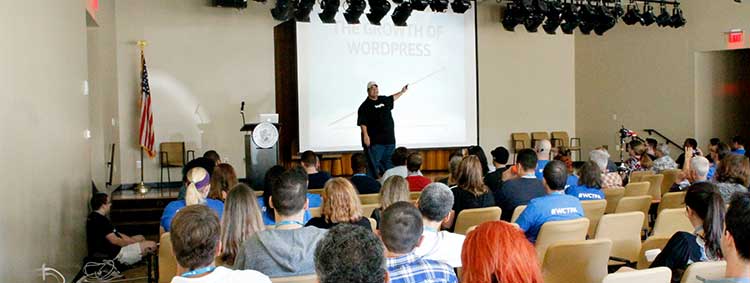
I spent the other morning listening to several people prepare talks for WordCamp San Francisco. If they are representative of this year's speakers, it will be the best camp ever.
These folks were truly amazing — with insight, humor, and intelligence.
I honestly had very little to add as they shared their presentations.
But, and you knew one of those was coming, right? But there was one item that I noticed in all the talks. One dynamic that I used to do too, and subsequently changed.
The normal introduction
Before I explain it, let me show you what normally happens.
When you start a talk, what do you normally do? You start by introducing yourself, right?
“Hi, my name is Chris Lema. I'm the Chief Technology Officer for a company called Crowd Favorite, as well as their Chief Strategist. Over the last twenty years, I've managed software developers, architected, designed and launched over 100 SaaS products.”
Let's break that apart.
1. I tell you my name.
Hi, my name is Chris Lema.
2. I tell you my job.
I'm the Chief Technology Officer for a company called Crowd Favorite, as well as their Chief Strategist.
3. I tell you why I'm qualified to give the presentation I'm about to give (aka my bonafides).
Over the last twenty years, I've managed software developers, architected, designed and launched over 100 SaaS products.
This style of introduction has been around for decades. You see it everywhere. And it works off a baseline assumption.
Here is the assumption.
People will pay attention to you if you can justify your expertise.
Makes sense, doesn't it.
Except when it doesn't.
Most of us don't have such amazing and stellar expertise to silence a crowd into listening intently to every word we say.
After all, I haven't met many conference speakers (even outside of WordCamps) that still my heart or cause me to shake in my boots because of their expertise.
Sure, most of us know something about something. But is our experience and expertise enough to suggest (even demand) that everyone pay attention?
I'm not saying that anyone is doing that. I'm not saying it's anyone's intention.
I'm simply saying that the origin of this approach was when there was a clear demarkation between speaker and listener to justify such an intro.
“Hi. My name is John Glenn. I was the first American to orbit the Earth.”
Boom. At that, we would all stop and listen. We'd all pay attention.
But were I to say, “Hi. I'm Chris Lema. I manage software developers,” you're likely response should be, “so what?”
We're a distracted people
The truth is that we're constantly bombarded with distractions. Even when we're sitting in a presentation.
There are tweets and hipchat messages, Facebook updates and instagram images to look at.
The person two rows up is talking.
The person two rows back is coughing.
And we're not sure if there's enough money in our bank account to cover where we might go for dinner.
That's why I've changed the introduction of my talks
I no longer start with the “I'm Chris Lema,” approach.
Frankly, I no longer presume that I have enough experience to suggest anyone pay attention to me simply because of my experience or expertise.
That said, if you have it, flaunt it.
But because I do what many other people do, and because my audience is prone to distraction, I start my talks differently.
I begin with a story.
And if you've been in any of my talks in the last two or three years, you'll notice what happens to my audience very quickly – often within 30 seconds.
Everyone gets quiet.
Not because of who I am.
Not because of my experience.
Not because of my expertise.
But simply because we all love a good story.
Here's how I end my talk
If my story captures attention, then it gives me the freedom to then make my point.
I normally try to have one point per talk.
That doesn't mean I won't have several (I hope) quotable moments.
But all in support of a single takeaway message.
And that message is always for my audience. It's never about me. They're the hero of my talk. They're the ones I'm helping or equipping.
But then, when I'm done, I do something different.
Instead of introducing myself at the beginning of a talk. I end with it.
“My name is Chris Lema. You can find me on twitter at @chrislema. I blog over at ChrisLema.com.”
It suggests that if they've enjoyed what they've heard, the call to action is to follow up with me and connect to talk more.
And I give them my info right when they can use it (to tweet, follow, or check out more of my content).
Your mileage may vary
When I wrote this title, I wrote, “consider this.”
The reality is that we're all different presenters.
So you may have an approach that works for you.
But I wanted to walk you thru an alternative approach that I've found to be a lot more helpful than what I used to do.
Like everything I suggest, your mileage may vary. But if it works for you, circle back and let me know.
Photo Credit: Lindsay Jo Designs

